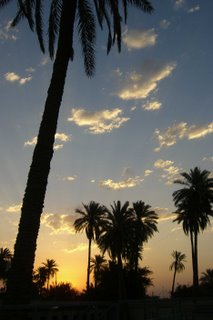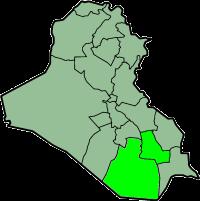B36 News - 01 September 2006
 (today's sunrise)
(today's sunrise)It's been a few days since I posted the last sunrise photo. Up until recently the sand that had been hanging in the air made for less than spectacular sunrises and sunsets. Today, however, the dust cleared and the amazing sunrises returned.
As I mentioned in previous posts, I've began working on a follow-up to the Winning in Iraq series, the title of which will be The Second Front. While I was writing Winning in Iraq I shared my challenges and progress throughout the process and I fully intend to do so with The Second Front.
The focus of The Second Front is going to be on how bad guys use the media to achieve strategic gains on the ground. So far, the biggest challenge I've been able to identify is that facts and figures will be few and far between since measuring perception and opinion is limited to polls. With Winning in Iraq, I was able to use documented accomplishments to show progress, with The Second Front I'm going to have to appeal to logic and common sense to a much greater degree.
Puttin' a Hurtin' on 'em
It's been a bad few days for the bad guys in al-Anbar province thanks to the Marines operating in this area. Recon Marines from 3rd Battalion, 2nd Marine Regiment, Regimental Combat Team 5 have been rolling through Mushin clearing out bad guys and their stockpiles of weapons.
Marines Doing What Marines Do“I knew we’d be busy, but not like that,” Cross said. “It was a straight-up kick-in-the-nuts.”
Cross said Marines knew immediately they put a dent in insurgents’ abilities to carry out attacks against Marines and Iraqi Security Forces. The areas they once considered a safe haven to hide weapons and refit are now the stomping grounds for Marines and soon for those Iraqi soldiers and police who will take over. Cross talked to one local man who told them operations were wreaking havoc on insurgents.
“He was real grateful for what we were doing there,” Cross explained. “That’s gratifying to hear that kind of result. We put a hurting on them. We slowed them down for a couple of months.”
(full story by Gunnery Sgt. Mark Oliva, Regimental Combat Team 5 posted in comments)
Kicking ass and taking names, that is. Not to be shown up by their brothers in Regimental Combat Team 5, Marines from 3rd Battalion, 3rd Marine Regiment, Regimental Combat Team 7 spent the last few days taking out bad guys in and around Haditha. The grand total in this story is 40 bad guys captured and three killed, all by snipers. Two of the three that stopped the Marine sniper's bullet's did so while firing on an Abrams (that's a tank!).
I'd like to have been there for that radio conversation:
Recruiting Up in Anbar (story 2)Tanker 1: *PING* [to Tanker 2] "Are they shooting at us?"
Tanker 2: *PING* *PING* [to Tanker 1] "Uh... I think so." [on radio to Sniper] "Hey, are they shooting at us?"
Sniper: *BANG* *BANG* "Not any more."
The success of the Marines in Anbar isn't limited to combat. In the month of August, Marines and Iraqi Security Forces recruited about 1300 new members into the ISF. As with the US military, before a recruit is given a gun and sent to work, he's put through intensive training and background checks. Bearing further similarities to the US military, the decision for many Iraqis to volunteer to serve their country is born out of a sense of national unity and pride:
“I want to serve our country and defend Iraq,” said one recruit through an interpreter.
“Patriotism… I want to defend my country,” said another.
After undergoing literacy tests, medical examinations, physical fitness evaluations and security screenings, the eligible applicants signed contracts adorned with the Arabic header, “In the Name of God.”
UPDATE!
 Dhi Qar Transfer
Dhi Qar TransferI've been hearing rumors of this transition of security, but this is the first report I've seen that named names. The southern province of Dhi Qar, which borders Muthanna to the north, is set for the transition of security from the Coalition back to the Iraqis. PM Maliki says that he plans to have most of the provinces in Iraq transferred back to Iraqi control within the year, a claim that is reinforced by the opening of the Iraqi Ground Forces Command which will also transition operational control of the ISF back to Iraqi commanders.




4 Comments:
CAMP FALLUJAH, Iraq (Aug. 29, 2006) -- Marines from 2nd Reconnaissance Battalion kicked over the hornet’s nest during Operation Rubicon in Mushin, Iraq, west of Habbaniyah. What they found underneath was a lot deadlier than a stinger.
They battled insurgents in running gunfights lasting nearly an entire day and scored hundreds of weapons finds in a several-day operation.
Recon Marines, working in support of 3rd Battalion, 2nd Marine Regiment, Regimental Combat Team 5, uncovered hundreds of weapons, artillery and mortar rounds, improvised explosive device-making material, small arms and ammunition.
In all, they recovered more than 500 mortars rounds, nearly 100 artillery rounds, more than 130 rocket-propelled grenades, more than 120 grenades, 22 mines, 10 mortar tubes, 20 rifles and machine guns, 18 sets of body armor and various other items including binoculars and bayonets.
“This area was definitely an insurgent stronghold,” said Cpl. Brandon M. Stair, a 25-year-old team leader from Utica, Ohio, assigned to the battalion’s B Company. “They had stuff for the long fight and they had stuff for tomorrow. There were initiator systems ready to go.”
Recon Marines found themselves in the thick of the hive from almost the moment they set foot into their operating zone.
Soon after inserting, they found a lone berm, which Marines scanned, according to Stair. They got a hit indicating something was buried underneath. They didn’t dig far to find buried weapons.
“It was big,” said Sgt. Joshua D. Cross, a 26-year-old team leader from Forestville, N.Y. “It was about 12-feet long and two-feet wide. It had a disgusting amount of stuff.”
Among other weapons, Marines uncovered rocket-propelled grenades and a complete mortar system at the first cache site. It was a sign of things to come.
Gunnery Sgt. Kenneth A. Westgate, a platoon sergeant for B Company, said all his team leaders are second-tour veterans for Iraq. They’ve learned to read the land and find the sites that harbor weapons caches. Their experience paid out.
“The whole platoon can walk and pick out sites,” said Westgate, a 35-year-old from East Wareham, Mass. “They’ve gotten to that level of ability where about 50 percent of the time, they’re right.”
Later that same day, Cross’ team uncovered another large cache site. This one was buried in a 250-gallon water container. It took them well into the night to get all the insurgent weapons out.
“We couldn’t reach down that far to get it all,” Cross explained.
So, he improvised. He stripped off all his gear and jumped into the buried container to get the last few pieces.
“I ended up sitting down inside and handing stuff up,” Cross said.
The mission continued, and that platoon set up a firm patrol base in their sector only to come under intense fire within a couple hours. Rocket-propelled grenades and mortars slammed into their patrol base. Insurgent machine gun fire raked the walls. Marines returned fire in a withering hail of bullets and pounded the attackers with artillery, sending insurgents fleeing.
“For the first day, it was non-stop,” Stair said.
The firefights started about 10 a.m. and lasted in running gun battles until nearly sunset.
“I thought it was going to be a long haul the first day,” said. Cpl. Peter H. Garguilo, a 21-year-old platoon communicator from Naugatuck, Conn. “It was pretty heavy fire. You knew these guys were going to stick around for a fight.”
Still, cache sweeps continued. These finds, however, were more than Marines expected. Marines moved to another location to start sweeping again. They didn’t get far.
“We thought we’d cover a lot more distance,” Stair said.
“We didn’t make it 100 meters and we started finding stuff,” Westgate added. “We had a problem.”
Westgate said the amounts of munitions they were uncovering was greater than the ability they had on hand to destroy it. They called in explosive ordnance disposal teams to assist.
The area was so littered with caches that they accidentally uncovered some. A demolition charge on one cache site ended up catching fire to some reeds. As the reeds burned, four or five more caches exploded in the flames.
“They just blew themselves up in the next 200 yards,” Westgate said.
Garguilo manned the radios for the platoon reconnaissance operations center. The information, he said, was overbearing. Teams were uncovering caches so quickly they were getting swamped trying to track them all.
“We had trouble in the ROC trying to keep up with the stuff coming in,” he said.
Cross said his team had to shorten their patrols. They simply couldn’t move as far as they planned without having to stop and dig up more buried weapons.
“We’d plan to patrol for two hours and six hours later, we’d end up coming in,” he said. “We pulled in some of the guys from 81’s Platoon to help. You’d get so smoked digging, you didn’t know your name.”
Marines from 3rd Battalion, 2nd Marine Regiment’s Combined Anti-Armor Team and 81 mm Mortar Platoon assisted the Recon Marines. The task was becoming much bigger than they could have imagined.
It was while combining efforts with CAAT Marines a vehicle struck a mine, killing one Marine from the CAAT section and wounding several others. It came on the heels of Recon Marines setting a time-charge on one of the cache sites. The fuse was burning and Marines were wounded laying in the blast zone.
Westgate explained Recon Marines rushed to the site to find several Marines nearby the wrecked humvee. They dragged the wounded Marines to a nearby ditch. The humvee was burning and munitions stored inside were beginning to explode. The fuse on the cache site was also still burning.
Recon Marine again grabbed the wounded and carried them to another ditch, further away. The blasts from the humvee and cache site sent debris and shrapnel flying in all directions.
“In many instances, we feel we were lucky to be alive,” Westgate explained. “There was so much stuff going on and so much stuff blowing up all around us.”
The blasts didn’t slow the Recon Marines, though. They continued their hunt.
Another cache yielded 500 blasting caps, each one capable of setting of a single IED. Another, mortars. In yet another was a stash of modified-silenced insurgent sniper rifles. Still, Marines found something they hadn’t yet seen. They’ve been operating primarily in Zaidon, south of Fallujah, where they came across their fair share of buried weapons. But not like this.
“Every cache was a separate set-up,” Westgate explained. “We usually find just mortars or just guns. These had a mix of everything.”
Stair said it appeared as if insurgents staged the weapons so they could easily fall back from one to the other. Some were found just thrown into the high grasses edging farm fields. Others were buried. Caches appeared to have weapons stored for bigger fights, and others bore 155 mm artillery shells with detonation cord and explosives already rigged so they could be placed along roads.
“You could tell that most of this stuff was still fresh,” Stair explained. “These guys were staging stuff.”
Marines even found AK-47 assault rifles in pristine condition.
The cache finds kept coming. They uncovered anti-aircraft guns at one more site. Then Marines found more rocket-propelled grenades. More than 50,000 rounds were captured. Stacks of artillery shells were gathered.
“The engineers would turn on the metal detector and it would go off almost immediately,” Westgate said. “Wherever the engineer went, we got a hit.”
“It was slow moving,” Cross added. “We could only make a couple hundred yards progress and we were finding more stuff.”
By the third day of constantly uncovering cache sites, Marines were cursing the mission they could have only hoped would be so successful.
“I knew we’d be busy, but not like that,” Cross said. “It was a straight-up kick-in-the-nuts.”
Cross said Marines knew immediately they put a dent in insurgents’ abilities to carry out attacks against Marines and Iraqi Security Forces. The areas they once considered a safe haven to hide weapons and refit are now the stomping grounds for Marines and soon for those Iraqi soldiers and police who will take over. Cross talked to one local man who told them operations were wreaking havoc on insurgents.
“He was real grateful for what we were doing there,” Cross explained. “That’s gratifying to hear that kind of result. We put a hurting on them. We slowed them down for a couple of months.”
Stair said this most recent operation was rewarding more than many of the others. He said Marines could see an immediate result. Every mortar, artillery shell and mine they dug up saved Marines’ lives. They are weapons no longer in the insurgents’ hands and the area is no longer under insurgent control.
“We’ve cleared 144 houses before and saw no result,” Stair explained. “I felt better coming off of this operation more than any other.”
“We poked that hornet’s nest a little bit,” Cross said. “We poked it with a two-foot stick.”
Amazing report! Marines. To the terrorists they are hunter/killers. To us they are lifeguards.
Thank God for the U.S. Marines, and all the other brave men and women of the U.S. and Iraqi. and other defenders of freedom...on the ground in Iraq....Menwhile back here in reno, the news says that 'violence has increased in August, yes more U.S. troops were deployed to Bagdad and at first it was less BUT (that is what they always say) in the past week or so it there are on average 800 attacks per day' B36, that is not an exact quote but it is pretty close to what Martha from ABC news says, and they all say the same thing. This is what we are up against. Thank God I can come here to HEAR the good news and the truth.
THANK YOU! I have known that OUR military is doing good and it is great to finally hear it too. Your add. was psted on our chatter by your dad and I appreciate it. I will put it in my add. book so I can read as you post it. Keep up the good work and God bless you guys. Ruth Hoffman LIvingston,Mt.
Post a Comment
<< Home